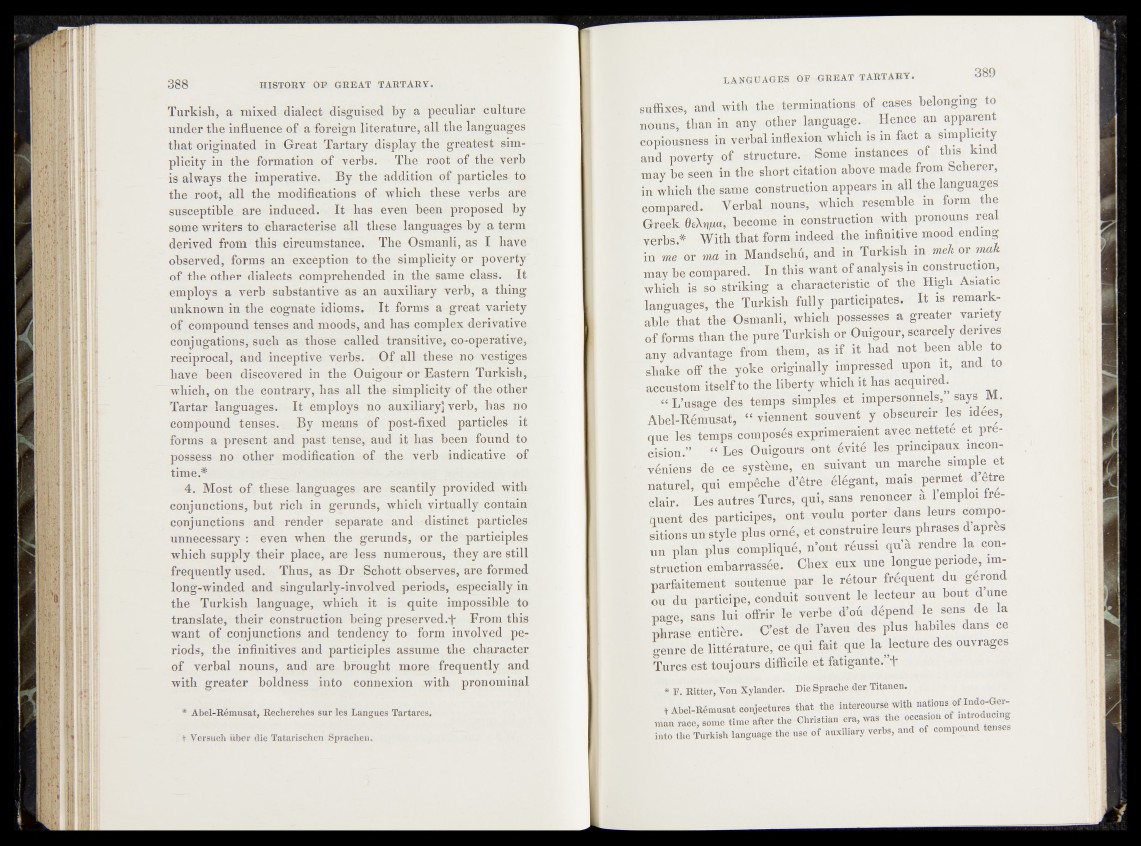
Turkish, a mixed dialeçfe disguised by a peculiar culture
under the influence of a foreign literature, all the languages
that originated in Great Tartary display the greatest* simplicity
in the formation of verbs. The root of the yerb
is always the imperative. By the addition of particles, tp;
the root* all the modifications of which these verbs are
susceptible ares induced. It has even been proposed by
some writers to characterise all these languages by a term
derived from this circumstance* The Osmanli, as I have
observed, forms an exception to the simplicity or poverty”
of the other dialects comprehended in the same class* It
employs a verb substantive as an auxiliary verb, a thing
unknown in the cognate idioms. It forms a great variety
of compound tenses and moods, and has complex derivative
conjugations, such as those called - transitive, co-operative,
reciprocal, and inceptive verbs. Ofi-all these' no/vestiges
have been discovered in the Ouigour or Eastern Turkish,
which, on the contrary, has all the simplicity of-the other
Tartar languages. It employs no auxiliary! verb, has no
compound tenses. By means of post-fixed particles it
forms a present and past tense, and it has been, found, to
possess no other modification, of the verb indicative of
time.*
4 . Most of. these languages are scantily provided with
conjunctions, but rich in gerunds, which virtually contain
conjunctions and render separate and ^distinct parfâcleSï
nnnecessary : even when the gerunds, or the' participles
which supply their place, are less numerous, they are still
frequently used. Thus, as Dr Schott observes, are formed
long-winded and singularly-involved periods, especially in
the Turkish language, which it is quite impossible to
translate, their construction being preserved.f From this
want of conjunctions and tendency to form involved per
riods, the infinitives and participles assume the character
of verbal nouns, and are brought more frequently and
with greater boldness into connexion with pronominal
*' Àbel-Rémusat, Recherches sur les Langues Tartares.
t Versuch über die Tatarischen Sprachen.
suffixes, and with the terminations of cases belonging to
nouns, than in any other language. Hence an apparent
copiousness in verbal inflexion which is in fact a simplicity
and poverty of structure. .Some instances of this kind
may >e seen in the short citation above made from Scherer,
in which the gfamp construction appears in all the languages
compared. Verbal nouns, which resemble in form the
Greek OeXvfia, become? in contraction with pronouns real
verbs* With that form indeed the infinitive mood ending
in me or ma. in Mandschü,..and in Turkish in mek or mak
may be compared. In this-want of analysis, in construction,
Vwhich is so striking a characteristic of the High Asiatic
languages, .the Turkish fully participates It is remarkable
that ? the-Osmanli, whieh possesses-a greater variety
of forms than the pure Turkish or Ouigour; scarcely derives
any advantage from them, as if it had pot been able to
shake off the yoke originally impressed upon it, and to
accustom itself to the liberty which It has acquired*
“ L’usage des temps simples, et impersonnels, says M.
Abel-R'étousatH( viennent souvent y obscurcir les: idees,
que les temps/composés exprimeraient avec nettete et pre-
. cisionv” “ Les Ouigours ont évité les principaux mcon-
véniens de ce système, en . Suivant un marche simple.et
naturel, 4 m empêche d’être/élégant, mais, permet.â être
Hi j Les autres Turcs, qpi, sans renoncer a 1 emploi troquent
des participes,- ont voulu porter dans leurs compositions
uû style plus orné, et construire leurs phrases d après
I un plan plus compliqué, n’ont réussi qu’à rendre la construction
embarrassée. ,:Chex eux une longue.period®, imparfaitement
soutenue par le rétour fréquent du gerond
ou du participe, conduit souvent le lecteur au bout dune
page, sans lui offrir le verbe d’oû dépend le sens de la
phrase entière. C’est de l’aveu des plüh habiles dans ce
genre de littérature, ce qui fait que la lecture des ouvrages
Turcs est toujours difficile,etfatigante*”t
* R. Ritter, Von Xylander. Die Sprache der Titanen.
t Abel-Rémusat conjectures that thé intercourse with na«ons o f Indo-G^-
man race, some time after the Christian era, was the occasion of mtroducing
into the Turkish language the use of auxiliary verbs, and of compound tenses